|
I wanted to share this video with you. I had held off doing so before because of a variety of reasons. The sound isn't quite right. Lee forgot her strap. The lens on the camera made it seem like we were in different rooms when we are actually right next to each other. We did not reject Lee! There was also mic trouble. Anyway, we had plans to clean it up or make a slide show, but things didn't work out that way. Still, we thought we would put it out even with its imperfections. The message of this song is important to hear right now. We hoped that the context would be different. “Marching Together” is an old song from the women's suffrage movement, used in the state of Kansas (among other places) to urge men to support women in their quest for equal rights. It was part of our Reformation Sunday service honoring the 19th Century trailblazer, Rev. Olympia Brown. You can hear the congregation singing it with us. We were proud and pleased and hopeful that the work of people like Brown would finally result in the election of a female president in these United States. As we all know now, it was not to be...at least this time. Of course, it makes even more sense to post this now. It makes even more sense for us all to learn it and sing it. Polls show that most white men supported Trump over Clinton. Many, many did not support him and I am one of those white men. However, we have our work cut out for us. It appears that our society has not come as far as we had hoped from that Kansas suffrage campaign in 1867. Now, about this song; Songs from the Kansas movement were collected and published together in a variety of forms over the years. This one comes from a book published in 1909. There is a lot of great stuff in it, including the lyrics we are using. I will link to it below. Actually, there are other versions, too. After we performed it at church we learned that the tune--also used for a happy song about Sherman's march to the sea--had been used for a song supporting the candidacy of President McKinley! There were also many variations to the suffragist version. However, most of of them played the “mother/daughter” card. These days we should be careful about men defining women based on the relationship those women may have to men (sorry Louis CK). I didn't vote for Hillary Clinton to honor my mom. I did it because she was (and is) the right person to lead the country at this time. We also chose this version because of the Kansas connection. It is quite likely a version that Olympia Brown would have sung during her work organizing there. I know I have mentioned her elsewhere. She is a hero of mine. A gifted minister, businessperson, and politician, she was the first woman ordained and recognized by her denomination (Universalist). She was also one of very few first generation suffragists who lived long enough to vote, herself. The song has simple chord pattern which, of course, is best for something everyone should sing. Marching Together G G Bring the good old bugle, boys! C G And let the truth be shown G G That woman has as many rights A(7) D(7) As any man has known; G C And let us help her win the fight G G She may not win alone A(7) D G While we go marching together CHORUS: G G C G Hurrah! Hurrah! We bring the jubilee! G G A D Hurrah! Hurrah! For woman shall be free! G C G G (Em) And have as many sacred rights as God gave you and me, A(7) D G While we go marching together! This is our arrangement, more or less. The other lyrics are in that songbook linked below. Lee Manuel set this up for us. Anything in parentheses is optional. 7th chords (in case you don't know) will make it sound old timey. We used them in the video but usually had someone else just play the regular chord at the same time. It keeps things exciting! Don't worry about changing stuff around to suit your style, skill level, and taste. You can't break it. It is a folk song. So there you go. Apparently some Trump supporters want to take the country back to a magical before-time. Let's give it to 'em and fight the patriarchy the 19th Century way! Here is a link to that book. It is wicked cool! You will notice that most of these songs are set to older tunes. This is a common practice in actual folk as singing along is a key part of the exercise. Just like hymns in church.
0 Comments
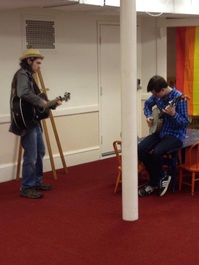 This Friday is the big Coffeehouse. We have two a year. This one--youth only--has always been the largest in terms of both participants and audience. There is an art show attached to it as well. The visual artists display their works and we keep them up for Reformation Sunday, which is also a big day in our church that includes worship, a "pageant" (about Olympia Brown), D&D, pumpkin carving, and the Jack-O-Lantern competition. Anyway, Friday is an important day for some of the kids and they work pretty hard to get the weekend going properly. It has always been interesting to watch the youth prepare. As young artists they are learning a variety of "languages" they can use to express their inner thoughts and feelings. It is a challenge for them. We all want to be understood. We also all know that our audience--our "public"-- will fall short of fully comprehending our message. Still, we try to get it right, don't we? To be fully human we have to try. A song--a painting, a poem, a photograph--comes from deep inside us. As artists our hopes are high. However, it helps to keep our expectations more realistic without also crushing that dream we wanted to share in the first place. I know how the kids feel. I have struggled to be understood in a variety of media over the years. However, the one I care about the most is preaching. I will never be a great (or even good) musician. My photography doesn't get much past the "pretty picture" phase. In pottery class I once made a 4-foot tall unbalanced black vase which may have been the ugliest thing ever offered up at a school art exhibit. I admit that I abandoned it. I walked away. For all I know it still sits there by the door to the North Yarmouth Academy teacher's lounge collecting cigarettes and dust. Preaching, though, I care about doing well. I feel it when I don't quite hit the mark. Yeah, preaching is an art. At least it is sometimes. It falls into the same category as chairs and benches. They can be built just to keep your bottom off the ground or they can be built to also elicit a feeling or a thought. I bet they--chairs--can even inspire action. I can go to the Museum of Fine Art to see (and sometimes sit on) a wide variety of items, or I can sit at my computer to get my emails done. One chair is not better than the other. They just have different purposes. One is a practical item that helps support our daily living. Our bodies and our backs are grateful for its presence. Another is all of that plus art. It makes us look up, out, down, or in. Even though we may be physically stationary we are, in fact, moved. Sermons should fall into that second category, even when people do not notice the "soul" within it. I have plenty of friends and acquaintances who work in professions where talking is part of the job. Politicians and lecturers (the good ones anyway) often use some of the techniques of preaching to improve their own work. Others believe there is no difference between a good lecture and a good sermon. Those folks are wrong, of course. You can give a fine presentation, but performing it in church doesn't necessarily mean you have come close to touching the sacred. After all, I can make a witty, informative, entertaining, motivational talk using the tools I am teaching those teens in my public speaking class. However, I still fail to preach sometimes. I have done it before (sadly) and I will do it again. The fact is, to create art one must dig deep. A good sermon--just like any of the offerings at our coffeehouses--requires a bit of personal exploration. It requires a moment of connection to the great "out there". In the moment of creation and interpretation we find that part of us and/or our world where normal conversation fails. Then we try once again to articulate it. As the Apostle Paul says in his letter to the Corinthians, "If I speak in the tongues of mortals and of angels and have not love, I am but a noisy gong or a clanging symbol." Finding that love (here used in its broad, theological sense) is the task of any artist--and we are all artists. The preacher tries to find some small glimmer of it each week to issue an invitation and offer up a path for people who hopefully feel drawn enough to walk another mile along the way. Preaching, like any art, requires discipline. We grow into our voices and into our "vision". Whenever you hear a sermon, you are listening to the product of hours, days, and years of prayer, meditation, and study focused into a tiny window of mere minutes. Sometimes it stinks. Sometimes it just isn't your bag. That said, have faith at least that the preacher is working hard. The colleagues I have met who didn't accept the preaching moment as a sacred one are all doing something else with their lives now. Leading worship isn't something you do without love. When I think of the kids getting ready for this weekend, I think of this process. I hope and pray that in their important and necessary playing around they find what they need to build a life of deep spiritual expression. I hope they find something that motivates them and makes all the steep lonely hours of practice and study worthwhile. The world of hard matter may never give them a measurable reward for their efforts, but maybe they will find that reward where they keep their souls and spirits. Maybe they will reach others through the foggy chaos of their existence.
Then--maybe--they will make us all a little less broken. 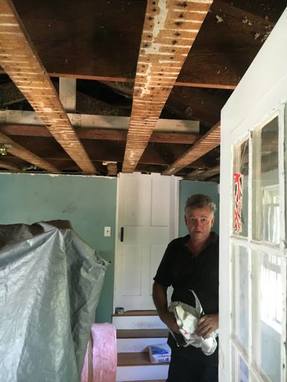 Jon the general contractor in his native environment early during "Alger House Repairfest '16" Jon the general contractor in his native environment early during "Alger House Repairfest '16" Last night my wife and I slept on cots in the living room as our bedroom ceiling is being repaired and the walls painted. In fact, this is going on in every room in the parsonage, in order. Each time the contractors move on to another room, we engage in a deep cleaning and a culling of stuff. Then we shove what is left into the middle in anticipation of the tarp that will protect our possessions. Then we do it again...and again. Of course each effort reveals a new problem that needs to be addressed. There is some ancient wiring that must be removed at some point before it catches fire. There are leaks in the plumbing that have developed over the last 15 years. There is also the usual sort of wear and tear that can be expected in an old building occupied by clumsy humans. In a weird sense, it fits right into my experience of sabbatical. In my mind I expected it to be peaceful, with an abundance of time for reflection and study. Instead it has reveled in impracticality and inconvenience. It underlines disorder. It shines a light on places in life where the workmanship has been haphazard. In my last post I described the church as being a place that sometimes gets wrapped up in measurable tasks at the expense of the spirit. It turns out that pastors get wrapped up too. We are as guilty as anyone of losing track of that path of faith and exploration. As much as anyone, clergy folks like to point to what we have built and--if it is good--say "I did this". At least we say it to ourselves. We also stress out about those times when we have failed. When we do, many of us are still capable of seeing our hands and voices in those moments. My sabbatical is full of tasks and goals. It is full of things that I can point to--good, bad, or indifferent--and account for time spent. However, I have lately felt the absence of that Transcendence which makes all the activity worthwhile. Or maybe I have just gotten around to noticing the absence. Maybe it drifted away a while ago and now as I search around for that connection I depend on, it is finally missed There are plenty of reasons why the feeling would recede, just as there are reasons I need it. Not only are all our possessions being shifted around the parsonage. There is plenty of motion and chaos elsewhere. One son is in college now. The car that has been a constant since before our youngest was born finally kicked the bucket while cruising down Rt. 128. Sabbatical, itself, has its own rhythm and requirements that open and close doors for me every day. I am getting stretched. Also, there are the more global issues. Black Lives Matter continues to underscore the existence of a system of racism that I--like the rest of you--participate in. The presidential election has made us all think about the pool of sexism we cannot seem to get out of. In fact, any member of the male species who hasn't been challenged by the antics of Donald Trump must be spiritually dead. It is a time for self examination. We cannot say we don't recognize him, even if we have never been like him. What are we men to become in this exciting new world? I know what I don't want to be. I don't want to be a burden, an impediment to progress, or a creep. What I am trying to say is that, like most people, I want to walk through the garbage dump of life equipped to be the best human being I can be. That is a hard thing to do. There is no way I am not getting some garbage on me. My spiritual life is what I rely on to get me through. I am (we are) reminded of various inequalities and oppression. We all push through times of personal; transition. We should be. What is the faithful response? What is my faithful response? The question today isn't about my work as a progressive and liberal minister of a progressive and liberal church. We all have jobs and I am blessed to have one that enables me to work toward solutions. The question is more existential and fundamental. How should I act? What should I do as a human being? More basic: Who. Am. I? One change for sabbatical is that I have made time for study and--consciously or unconsciously--also ended up with a system of accountability. I have written elsewhere about how Dungeons and Dragons encourages the imagination. That curriculum for the RE program requires not just facts and figures but a a level of religious intention. Those courses I am teaching force me to explain and examine some fundamental elements of my own belief system. Hanging out with teens can change your perspective as well. However, maybe the best articulation of the spiritual problem I found was thanks to good ol' Ralph Waldo Emerson.
If you read this blog you are aware of the fact that one of the courses I am teaching is entitled "Nature and Spirituality". Perhaps not surprisingly, one of the readings--in fact the key one--is Emerson's "Nature". It turns out that it is a bit of a challenge to explain to kids, particularly because I and they get hung up at the same place Emerson did when he wrote it. That place is the philosophical concept of "Idealism". For Emerson this material world (or "nature") is infused with the Divine. Ultimately what is real is the soul, It is God, It is the spirit that has ultimate and permanent substance, not the matter that it inhabits. I could go on about his take, but instead you should read the book. The problem is that for those of us who try to live a life of the spirit face an enormous hill to climb. The problems that we are all wrestling with and that cast a pall over our regular lives need material ("real-world") solutions as much as spiritual ones. In fact, our basic needs in a world in crisis obscure the spiritual ones to a large degree. How, for example, do you explain to someone who cannot get enough food to eat, or who fears the reality of daily violence that they should contemplate the divine spirit that flows through all things? Of course, there is another question that should hit closer to home for most readers of Burbania Posts. How do we connect with the spirit in people who put their own ambitions and desires over the basic needs of others? What do we do to make them (us) see that spirit in such a way that there is a change of heart? We aren't starving. In fact, most of the people I know are not lacking in material wealth. We are the ones who can make the changes to create abundance for the rest of the world. In giving up our own material ways we can free ourselves, too. Such potential! Such inertia! Dang! If you asked me what my bedrock beliefs are I, like Emerson, would claim to be an idealist, but we are living (to quote a certain 20th century bard and philosopher) in a material world or, at least, in a material culture. There lies my own tension (again, in the philosophical sense). I expect it does for others. To be a person on a faith journey is to be a person who at some level accepts that there is more. There is something greater (maybe "God", maybe not). There is something behind what we see and interact with that is worth knowing better. We expect it to sustain us, after all. We may even hope, like Emerson, that we can experience a holy and absolute connection to that "Oneness" that will give us the strength to let go of all the crap--material, emotional, spiritual--that we cling to. As we let go we may fall, but where we land will be a better land than the one we left. That said, the journey is long. When we feel the absence of meaning it is important to fill the space with the right thing. I do believe that there is more to the world than what we see. However, it takes patience, insight, and effort to connect to what lie behind our mundane existence. Over the last few months I have gained a new appreciation for this dynamic in life. I have also gained an appreciation for the institution of Sabbath. A question, I think, for all of us as a community and as individuals is how to bring the sabbath back. It is more than "time off" after all. How do we find the structured time to return the sacred to our hasty lives? Thank God I go to a house of worship. Thank the Divine presence that I can take part in a community to support my own journey even as I support them. I give thanks that sometimes--during my better moments--I can get a glimpse of the spirit that flows through us all. Thanks for the strength to move through the darkness and the struggle. Thanks for the power to grow and change. 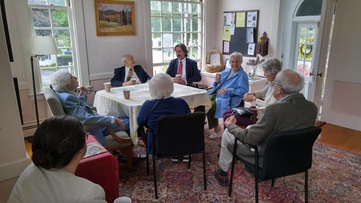 There is an article floating around my Facebook page that suggests the near death of spirituality in the protestant churches of the United States. In one way it is just another clergy clickbait article. It has one of those titles, after all; "5 Reasons Spirituality is No Longer Important to the American Church!" Also, it comes from a long line of "this is why we are shrinking" complaints and it--although the author points out that we haven't ever really be that good at spirituality in the first place--at least implies a fix . In these ways it fits just the sort of church-story I warn people about. However, it does underline a problem and it is a serious one. Here is an example; my dad, who isn't a church person at all, told me the other day that he had noticed that a certain type of institution was "picking up the slack" from declining churches. Guess what they were. Were they new age bookstores? Retreat centers? Martial Arts and yoga? Nope. He said they were libraries. Libraries!? What could he mean by that? The problem is we know exactly what he means. Libraries are another place--just like churches--that provide non-religious and non-spiritual services. They are a good gathering spot to talk about issues and to get to know people. I have a great one a block from my house. I love it. Dad's implication, of course, was that what libraries do is also what churches do. That is, not spiritual services, but community services. It is hard to view something as a spiritual place or a house of worship if you aren't interested in what those terms might imply. Secular society frequently sees a community center where some of the people engage in magical thinking. To a large extent, this is exactly how we sell ourselves to the world. That is the problem. Folks inside and outside the church see the congregation in pragmatic terms. It does what libraries do. Or what the salad bar did for single people in the '90's. Where can I meet people? What is the best way for me to impact and improve my community? Where can the kids get that little bit of enrichment--often with very little home reinforcement--that comes from Sunday school? I could go on. We see church as an avenue for good works. What we frequently miss is the spiritual grounding that is supposed to go into those works. Isn't spirituality supposed to be what the church does best? In my previous post we learned that for Frederick Henry Hedge the "north pole" of the church represents mystical connection to the Divine. The south is for rituals to help us get there. The west draws us to adventure and exploration of ourselves and of the great and wondrous world. The east grounds us in our core beliefs. Many people work hard to situate themselves and their communities on this compass but we are so distracted by the practical bits--rental agreements, the big fundraiser, the fall fair or the new initiative--that we can lose track of why we are doing these things. Church isn't just a place to be busy or to be in some sense a good citizen. We do these things through a congregation because we are spiritual beings trying to live lives that are in some sense religious. Sometimes I wonder if all our activity actually is part of the problem. Most of the ministers I know work hard to develop their own spiritual paths. Some of them are involved in rituals and pilgrimages. Others are more likely to study or discuss. Virtually all of them try to pray and meditate. They offer these options at their church from time to time. They try to provide explicitly spiritual opportunities for children and adults. Rarely do these programs become popular. There is a small core in each congregation who has the interest and can make the time. There are others who would like to participate as well. Yet we instinctively know what will bring the most people out and the emphasis goes there. When we do this we risk becoming a library without books. Which is to say a library you might visit but are unlikely to join. I do wonder what the new church will do to lift up this central element of church life. The challenges are many. People cannot (or will not) make it to worship on Sunday morning in the numbers they used to. Other times all seem problematic. Clergy are expected to be a resource on these topics (and are) but few people ever ask them a question. Some people feel that there is so much "important" stuff to think about (like the acquisition and maintenance of money and stuff) which leaves little time to consider the reason we exist, and what makes a just and holy life. The new church will need to find a way to reach out to those folks. Also, the church needs to figure out a way to cast a line to those people who try to be part of the spiritual life and cannot do it on their own. These are the people who grace our pews when they can. They may think they are there for the coffee and the committee meeting but they aren't. They chose the church (or synagogue or mosque) over the library (or rotary or diner). There is a hunger that may not be fully understood and articulated in each of them. How does the new church find that hunger? And how do we feed it? Here are some links... First, to the article I mentioned: 5 Reasons... Next, here is a link to my local library. Frankly public libraries are struggling, too. In fact, most places where people gather together for free are having a hard time. Patronize them, and drop some money in the plate. They do good work. Here are links for other articles in this series The first one is a "Prequel" Here is Chapter 1 Here is Chapter 2 Here is Chapter 3 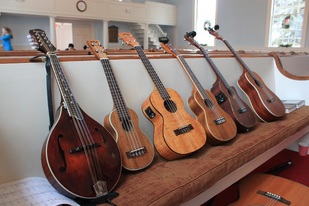 By Chapter 3 we should have a good idea what the problems are. The established church and all its institutions are in crisis. The ship is sinking. The strange part is that what we mostly do is run around trying to save it! Getting lighter or leaner doesn't help on its own. Pumping the bilges doesn't really keep the flood at bay. I hate to say it folks, but it is time to test the water. We need to make plans before the clock runs out.. We are not alone, of course, all kinds of non-profits and service organizations are sinking too. We also have a cloud of congregations. We all must think creatively. Maybe we need to make a different boat out of the old one. So...what will help us do this? At this point it might make sense to survey the ship. What is its fundamental function? What are its fundamental parts? I am concerned primarily with the liberal church but this applies to others as well. In order to get our bearings it makes sense to look to models that have been used in the past. Naturally (at least if you know me and my own tendencies), this made me think of that great transcendentalist theologian of the church, Frederick Henry Hedge. You see, many years ago (in the late 19th Century) Hedge preached a sermon called "The Broad Church". In it he discussed the sources and forces that could make his inclusive tradition even more so, while also keeping it grounded enough to be something other than a discussion society or social clique. Like others before him, he organized his thoughts around the image of a compass. The goal at this point isn't for us all to find the same point on this compass. Instead it is to find our own place between the points. As you read the descriptions you will see that your congregation may travel farther "north" than some. Others may have found a strong place in the "east." This is a good thing. To Hedge the goal was to get situated, be ready to travel, and to be open to seeing and experiencing the perspective of others in their own places. This he called the "Broad" or (small-"c") "catholic" church. A church that knows what it is but is also adaptable and welcoming. Now, he chose his points based on his own New England biases. That is to say, he labeled things "North," South," "East," and "West" pretty much based on the worldview and understanding of his culture and his friends. Don't get bogged down in that. What is important is that he is trying to situate each broad (wide, open, non-creedal) church somewhere between these four elements, each balancing out (and in conversation with) the others. Hedge began with the east. For him this pole stood for the unchanging and eternal parts of the community. This is the pole of core belief. It is the story by which we tell our own stories. "The east is the region of steadfastness, of perpetuity...Every church must have its conservative side, its point of resistance, its fixed fact." Even churches like our own need something like this to hold it together. Without the eastern pole, we are adrift. There are churches (liberal and conservative) who try to hide it and who (at least among the liberals) even deny it. Yet the east is there for us all. What it is varies of course. In the case of my own congregation we take the teachings of the heroes and stories of the Bible very seriously, even if we do not always agree in interpretation. There is our covenant as well "In the Love of truth and the Spirit of Jesus, we unite for the Worship of God and Service to All." Also, though it may seem strange to some, the idea of a non-creedal tradition is itself a central belief.. We explore our faith together, with the understanding that we will disagree. For another congregation the eastern pole may be different. It may provide a greater or lesser pull. However, it is there and gives us a foundation on which to build. It also gives us something to struggle with and against.. "Christianity," Hedge writes "though bound to a given idea and to certain immutable truths is not, for the rest, a fixture, but a movement and a growth." What keeps our faith vibrant and growing (here we are talking about spiritual growth, not numerical growth) is that opposite pole. The west calls to us as well. Back in Hedge's time the image was an obvious one. There the "wilderness" started right outside Boston's western suburbs and stretched all the way to California. For the people of the area and era, it stood for almost unlimited potential.
That said, it is hard to get up for the western hike sometimes. When we think of this pole there is both excitement and fear. It calls us to creativity in both our personal and corporate lives. The west is uncomfortable. Still, we need to do go there, don't we? Henry David Thoreau wrote (in "Walking") "Eastward I go only by force; but westward I go free." Hedge asks us to consider what we are holding on to that we don't need to take with us in our new explorations. In church language, how many times have we used the phrase "we have always done it this way" as our sole excuse for not changing? What holds us back more than anything else is that fear of failure. A journey into the wilderness inevitably leads to numerous misadventures. When we are finally safe and sound we love to look back at them, impressed by our own perseverance. However, at the time they are just painful. They challenge our sense of self. We are embarrassed. This is one of those places where an attitude adjustment is in order. We need to get over ourselves. We have to explore and experiment. We must prepare ourselves for mistakes and wrong turns confident that our final location will make it worthwhile, even if we don't ultimately know where that is. Thoreau reminds us that "We go eastward to realize history and study the words of art and literature, retracing the steps of the race, we go westward as into the future, with a spirit of enterprise and adventure." OK... So what does that leave us? The north is the next on our list and for Hedge represents ideals and mystical connection. Quite simply, for most folks (my hero Larry Wilmore being a notable exception) the northern arrow points "up". This is the direction we think of when we think of the transcendent, the Divine, God, or the Great Whatever. This is what makes congregations unique. We are into the big question and the big connection. An internal urge--small or large--toward exploring this dimension of our lives is what drew us to find a church. We know we won't ever have all the answers. Yet we travel north in fits and starts. Our communities of faith are frequently the gates and doors that we take to go that way. Frequently it is where we find the best companions and the clearest road. Hedge reminds us that "mysticism is a very important element in religion--a feeling after God... It is that by which religion lays hold of the invisible and enters into fuller, that is, more conscious and intimate, communion with the spiritual and heavenly world." Finally, there is the south. Here is the home of ritual. Hedge says, "A church requires a ritual, requires symbols and sacraments,--something outward as the exponent and medium of ecclesiastical life." North and south work together to help us connect to each other and the Divine. In a church like mine, it may at first seem like we don't have many symbols and sacraments. However, it just means that what rituals we do have grow in importance. Our worship services--while comparatively simple--are filled with elements we expect to sustain us. The cross behind the pulpit reminds us that not everything is about us. Sermons, hymns, special music, contributions for our kids and monthly communion help us, through steady and meaningful repetition, to look north to God. Do you see what these points have in common? They are all religious. They are all spiritual. They aren't about programs, budgets, or membership initiatives. They are about the deep and the eternal. They are about the thing that no other organization does as well as houses of worship. If we are to build the new church out of the old, it makes sense to start by situating ourselves in the seas of spirituality. What better thing to use than a compass, helping us to narrow our thoughts down to the basics? Other institutions and projects may grow out of our foundational work. They certainly should! Still, we need to remember that they are secondary. Buildings are nice to have, Sunday school is, too. It is great to have money and staff. It is lovely to bring them all together on Christmas Eve and Easter Sunday. Yet without these four points what we do is nothing but a show; a chance for warm and transitory feels. So, where is your ship? How do you situate yourself? How do you situate you community? Where you land will say a lot about the direction to take. Then we can ask ourselves if we need to move or--just as likely, possibly even more--we can ask what new church we need to build in the same spot. We should also remember that finding the location of others will help us form coalitions, squadrons and fleets to do the work of church together. As denominations break down and seminaries alter their course, each church has to find its way, but we do not go alone. Hedge concludes his sermon by saying "Let each church labor in its place and kind to develop and assert this catholicity, and the boundary lines which divide the sects shall be washed clean out in the gracious life that shall flood them all, and fuse them all into one prevailing kingdom of God, whose unshut gates shall exclude none that desire to enter, and where east and west and north and south shall meet in peace and join in praise." That is in for Chapter 3! If you made it to the end, I congratulate you. As you know this is part of a series. I am not sure what comes next. If you have any thoughts or stories to share about the new church being built at your spot of spiritual life, please share! Here is Chapter 1 Here is Chapter 2 Here is Chapter 4 All Hedge Quotes are from his sermon, "the Broad Church". 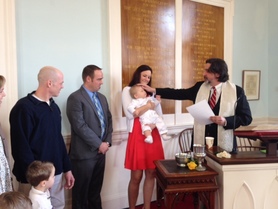 We are back! Last time I talked a bit about my "listening tour". Thanks to my flexible sabbatical schedule I am able to visit my friends and colleagues and hear a bit about how their church lives are going. The upshot is that people are frustrated. Just as we see in pretty much every other area of life, the way people are doing religion is changing and old, steady, tried-and-true institutions are having a hard time adapting. My colleagues and I are on the front lines of this shift. Trained in the "old ways," part of our job is to meet those old (and still important) expectations while looking ahead to what comes next. In this second installment of the "New Church" Series we will examine another couple of areas where people are finally noticing the massive shifts in our church life. Last time we talked about denominations. This time let's discuss clergy. I will include a link to Chapter 1 on the bottom of this page. Clergy Must Learn Different Things and Learn Them Differently When I went to seminary I received the usual education. There were excellent theology classes. In fact any academic discipline was well-provided for in quality staff and literature. I use what I learned from them pretty much every day. This is a good thing because there were a lot of those sorts of courses. I spent a great deal of time learning about the Bible, the history of the church, religion and science, religion and philosophy. Then there were practical courses that were frequently also taught by academics who--while they had more experience than me--didn't necessarily have a whole lot of actual experience in what they were teaching. To counter this, at other times they would bring in people who had some experience (not as much as one would hope) but who frequently couldn't teach! They were on campus for other reasons and were dragooned or seduced into classroom time. Many of us left seminary with a deep well of spiritual and religious knowledge that has served us well. That said, if it wasn't for my excellent internship under the guidance of Reverend John Corrado and the Grosse Pointe Unitarian Church I am not sure I would have survived my first settlement. The fact is, some of what I learned in school about the practice of ministry was simply wrong. Maybe it would have worked in a vacuum. However, the void doesn't have protestant congregations. It has been a while since seminary for me. My experience since tells me that things are changing for the better. When I enrolled in my Doctor of Ministry program I was delighted with the results. It was practice-based. It adapted to our ongoing ministries. The adjunct practitioners were top-notch. Best of all, these big-name homiletics professors knew their strengths and weaknesses. What a blessing it was when I asked a question in class one day and my teacher (a publisher of many books) responded with "I don't preach nearly as much as you do. I bet you can answer better than I can." Thank you. I am pleased with the direction that seminaries are going. I also know that more change is on the way. Of the four seminaries I know best one is dead, two are in the process of completely transforming themselves and one still looks the same but I know it is constantly adapting. In two years none of these four will be on the campuses where I studied. There will be more losses and transformations to come. I am actually pleased that they have risen to the challenge. Clergy need to learn new and different things. We need to be flexible enough to let that happen when (as we have noted) we don't really know where God is taking us. Churches Need to Ask Themselves if They Need Clergy Yeah, I said it. The fact is, as we develop new models for congregations (or whatever we choose to call them) some of these models will not need a religious professional. At least they won't need one all the time. They may need a consultant or a theology teacher every once in a while if they are a small yet high-commitment church. Maybe they need a circuit rider to come preach every once in a while. It is possible that many of these new religious communities won't be meeting for one big worship every week. When you add this to the changing view of clergy and of "leadership" in general, even congregations with a full time pastor or two may want to think creatively about how they want to use that person's time. The decision can go either way. The trick is to be creative. As I was leaving my first settlement I remember telling the congregation that what they really needed was an administrator more than a minister. They were already pretty good at doing a lot of the pastoring themselves but could use some coordination. In my current settlement everyone is so busy they need a minister. It is a small and dedicated membership afflicted by all the busyness that comes with suburban life. We have talked about it and it is hard to imagine a healthy congregation in this context where the clergy staff isn't heavily invested in whatever the "new thing" may be. Incidentally, we are also a teaching church if there are any seminarians out their interested in experimenting... So, practically speaking, what does this mean? It means some creative thinking for everyone, but particularly for lay leadership. Obvious changes like bi-vocational ministry (ministers having another non-minister job), part-time pastoring, "yoked" congregations, and licensed or lay ministers are the sorts of things that religious professionals are familiar with. Right now my friends and I are having a semi-humorous Facebook conversation about who would do better in the food service industry when we need to scale our ministries down! In short, we are ready for change...but maybe not all of us for professional kitchens. The problem (and to be clear, it is nobody's fault) is that we are stuck in a cultural vacuum. The perception of the church and clergy in the current culture is based on an "ideal"--and primarily fictional--image from two or three church-phases ago. To most people a protestant church pastor is married but very old and almost certainly male. He has to be, because in our heads his wife is still running the Sunday School...for free. This hasn't been the situation for a long time. It probably never was the situation. However, while most congregants as individuals would acknowledge that fact in a heartbeat, the system still acts like this is the way things are. We all (clergy and lay) play into it. We see our divergence from this model in terms of compromise and failure. How do we change this to terms of opportunity? A different sort of pastor may be just the thing for many congregations. A leader who is also a teacher, a lawyer, a musician, an artist, a warehouse worker or barista would naturally open up different sorts of ministry. It would also give the congregation a flexibility it wouldn't otherwise have. That new leader of the "new church" would have experiences to draw on that other clergy would not. It would be an exciting, unique and different opportunity. We face an entrenched image if "respectability" and "success." We need to break out of the trap and go on the road willing to be more like the prophets of the past. Only then can we open ourselves and our community to the variety of opportunities that abound for the spiritual life. That is all for now. In many ways this area is the place we have seen the most change. That shouldn't be surprising. If the clergy are doing their job--and rest assured the vast majority of us are working very very hard--we should be out ahead. Another big challenge might be in how we learn from the transformation (and yes, death) of our schools. What can we take with us to the people we serve? Anyway, food for thought. Thus ends Chapter #2 Here is the link to Chapter #1 TO BE CONTINUED
All is suddenly quiet at the parsonage. My wife is off to work, Son #1 is off at college, Son #3 is having his first day of school. Son #2 is about to get some work done in preparation for his first day of classes next week. My plan is to have some coffee before the weather becomes inhumanely hot. Then I will settle in to the second day of catch-up on my third most pressing sabbatical project...Dungeons and Dragons world building. You see, the youth groupers have been asking for a D&D (or more generically "role-playing") club for a long time and we--the pastoral staff--just haven't been able to find the time for the basic preparation necessary to get a solid, believable game going. Both I and my former intern (now sabbatical pastor) Shane Montoya have plenty of experience in this area. There is a story line to be developed, of course, and a dungeon or whatever seeded with badies. However, the story has to take place in context and that is where it becomes tricky. A good game needs geography, politics, and religion. It needs characters with motivations and depth well past what is provided in a 90-minute action movie or even in the most well-developed fantasy video game. It needs a world at least as complex as a quality novel. In some ways (because the players can literally travel anywhere) it needs to have eternal potential for even greater complexity. So that is what I am doing. I am building a world (part of one, actually). I have been doing this sort of thing since my very early teens. Back then, it was out of necessity. It may seem strange to my younger readers but Gen X (and older) nerds know the situation I was in. I was an early adopter of Dungeons and Dragons. I loved it. Even today I occasionally drag out my old Basic and Expert books just to experience a wave of happy nostalgia for a less complicated time. It was my refuge. It was my permission to dream. Still, there were a series of hurdles to clear before actually playing the game. The problem, quite simply, was that D&D was the ultimate badge of awkwardness. Nerds are kind of cool now (okay..."geeks" are cool...whatever posers) because some of them now make money. Society says money is magic. Back in the Lord-of-the-Flies '80's, though, it took courage to spend a day rolling the dragon dice or discovering the inner workings of your Commodore 64. Personally I wasn't so much brave as fatalistic. There was no way I was ever going to be the cool kid. I had bad skin, a bad haircut (until I stopped cutting it entirely), and I went to prep school where I loved the theater. Many of my nerdy friends, however, harbored dreams of acceptance and were fearful of what the game might do to their (frankly non-existent) cool points. Even today I know 45-year-old men (and some women) who I am certain played but who will deny it. It is their secret weakness. It is still their hidden curse. Needless to say, back then it was hard to get a game together. Sometimes I would manage to get a ride to a game shop a few towns over and play with a group of kids I didn't know so well. The big draw was that the Dungeon Master wrote modules for Iron Crown Enterprises. No. I won't explain what that means. Either you understand or you don't. Most of the time, however, I had to badger my cowardly friends or indoctrinate my (much more willing) brothers in order to get a game in. This meant I was always the DM. I was the one who ran the game and did the extra work well before the others would arrive. I resented it at the time. I still do, actually. Still, those hours spent on my own fantasizing about other imagined places has come in handy over the years. The various "pantheons" of gods and goddesses got me interested in actual religions. The vagaries of the always-inadequate alignment system got me interested in ethics (I mean, who ever actually believes that they are the evil ones?). The game play was a combination table-reading/improv (with a touch of randomness from the dice) that got my creative theater juices flowing. It also let me make something and share it. I cannot write a novel or a play, but I can create a place where novel-like stories can happen. This may not be "cool" in the middle and high school sense, but it certainly is cool in every other way. Anyway, I have been making a new world. My old ones are rushed and inadequate. It is hard work, actually. To be believable, things need to connect in believable ways. For example, in an action movie the bad guy can always be crazy. In a game where most of the imagined population is rational, that doesn't work. Crazy-evil makes it hard to get followers, after all (don't yell "Trump" at me...please). If people are seeking power they are going to gravitate toward a rational power-seeker. A strongman, maybe, but not the cackling cartoon psychos that TV cops and superheroes take down on a regular basis. The questions one has to answer in the game world are the same sorts of questions we would ask about a culture in our world.
Interestingly, the questions I ask now are different from the ones I used to ask. Times have changed, haven't they? So this new imagined world is built around a question I have had for some time. What would happen if you had a group of people who constantly talked about their god? What if they read his/her/its sacred texts and disagreed over their meaning but who tried to live their lives based on what they felt they knew about this god they cannot see? Was this person they follow a god? A prophet? A good (or bad) myth? A Metaphor? In role-playing games the gods are just knocking around, granting spell powers and so on. To have an absent one is a big deal. Perhaps up to this point, things make sense. What if we took it a step further? What if at some point that "god" (or myth or metaphor or prophet) returned and started doing stuff? What if it refused to clear up doctrinal conflicts? Who among the believers (or suspecters) would be the most disappointed? Who would be happy? Anyway, that is the starting point. Then there are questions of economics. What do these people do for work? Where do they live? There are questions of politics, too. How do they get on with other people from other more (in game) conventional faiths? What is the role of women? What about the LGBTQIA+ community? It's my world. I can make it how I want it. How are they organized from family, to work, to "church", to government? How are the people around them organized. That is how the world grows. There are a bazillion questions. It isn't ever finished and much of its development depends on gamers playing through and asking their questions. Still, a lot of groundwork needs doing before that player characters ever meet in the ubiquitous back-road inn. Now, I know that many of the people who play the game probably won't notice the work that went into it. They shouldn't. The world should be lived-in and seamless. Besides, most of them will just want to kill monsters and rack up "points" like it is World of Warcraft. That is fine. However, I will know what is there, and a few players might even take an interest. You make a world to answer your own questions. You draw a map because you want to know what is behind (or under) the mountains. Others participate as they are willing or as they can. I have to go soon so I will stop here. Shane is helping me with the game mechanics as I drift into story teller mode, so I have deadlines. No doubt you will hear more about this as time goes on. Or...you could just show up for a game or two... So today is the first official day of my sabbatical. I have already been working on various projects but in the next week or so, things will be kicking into a higher gear. Over the last few weeks, there have been some changes to the plan. My "Folk Project" will need to take a back seat to some more pressing material. In fact, a theme has emerged that runs through most of the other projects and, naturally, this is something that I intend to follow.
I am enclosing here the outline of my work for the next few months. They are roughly in the order they will be addressed. Of course, there will be some overlap as well. Teaching: Some of you are aware that I have a son who is "homeschooled". The term--while it makes sense from a legal perspective--is a bit misleading. Most homeschoolers do NOT spend their days sitting around the kitchen table. They are highly social and are involved in programs outside the home on a daily basis. Many times they have a great deal of control over what and how they learn. It can be complicated, but for a certain kind of kid who is willing to take ownership of their education, a well-conducted homeschool plan is just the best darn thing. Among other activities, my son attends a school that subscribes to a "self directed learning" model. It has teachers and advisers who help the student plan out their year. Various courses are offered by the teachers, volunteers, and interns based on the interests of the student body. This is where I come in. I will be teaching two course at the school this fall. One is Public Speaking and the other is Nature and Spirituality. I know a bit about both subjects and expect to learn more. I am looking forward to this. I am curious how it will go. While I have done some teaching with children in this age group (10-19), it has been mostly in a church context. Of course, there is a great deal of similarity between a Sunday School model and what happens at this school, so it won't be entirely unfamiliar. Still, it is good practice and a lot more "face time" than what I am used to. Each class meets formally once a week and then I will be available as a "mentor" at other times. Thanks to this time commitment, it is the first on my list. Church Curriculum: I have written about this before. We are transitioning our Sunday School to a "one-room" model with a series of "units". Each unit will lead to some kind of project or presentation in church. I am responsible for writing all but one of these. My former intern (now sabbatical pastor) will be writing the second unit on Advent. I have already written the first unit, which is about women in the church. This means that the next one I am concerned with (a social justice unit with a focus on LGBTQIA+ issues) will need to be ready some time in November so the teachers and I can go over it before it's January start date. Obviously, the teaching I will do at the school will influence how I go about these curricula at church. In both cases there is a "project" element. Also, they both work on a student-centered discussion model. A great deal will depend on their willingness to be engaged and our ability to engage them. I am actually moving a little slower in this area right now because I think that my perspective may change after doing some teaching. Dungeons and Dragons Club: Yeah, there is this. I am well into the development of a world for my player characters to explore. I have been a Dungeon Master for many a year, starting way back in my teens when being a nerd wasn't so cool. Perhaps that is why I am still a bit surprised by the level of initial interest from the kids. It is a great thing! I am very pleased. My goal is to have enough material ready for a first meeting near the end of September. At that point we will make characters and perhaps run through a couple of short battles or scenarios to see if everyone gets the game mechanics. It would also be good to see who actually shows up so we can plan for either one or two groups. I will probably also need a rotating cast of "assistant DM's" to keep things rolling... OK... I assume you see the theme, right? All of these activities will apply most directly toward the church's religious education program. RE has been an interest of mine ever since my first paid gig as "Co-Youth Group Director" for the middle schoolers at the UU church in Evanston, Illinois. In my current capacity I don't have as much time to do get into it as much as I would like. I am hoping that using my sabbatical time to get the prep work done will make me a better pastor to the kids and their parents. We shall see... What this does mean is that the who Folk Project must be the last of my concerns. I haven't given up on it entirely. However, the spirit does seem to be moving me in a different direction right now... I am technically on vacation, but I have taken a little bit of time to get started on one of my sabbatical projects. You see, we are trying something new in our Sunday school. We are going to a "one room" model in which all of the kids will work together on a single topic and then (at the end of each unit) will present something (a play, readings, music, or reflections) during worship. I, at least, have high hopes for this. I hope the kids are engaged. I hope the parents are engaged as well. Maybe that is why I have taken it upon myself to develop the curricula for four of the five units.
The first of these units (ending with a play on Reformation Sunday) is about women in the church. In particular, we are focusing on one of the giants of Universalism, Olympia Brown. There is a lot to say about her. Here it must suffice to point out that she was a "first-generation" suffragist, an abolitionist, and the first woman to be ordained and serve a congregation while also being fully recognized as a minister by her denomination. She was smart, determined, tough, and (according to many) a great preacher and pastor. In my world she is held up as a role model for ministers of all gender identities. Of course, I want people in my church and Sunday school to know more about this remarkable person. However, I am also well aware of the context in which they will be learning about her. This unit begins when people come back from their summer adventures and it will end on October 23, the day Brown died (in 1926). Obviously, we will be thinking about another leader during that time. We will be thinking about (hopefully) the impending election of Hillary Clinton as the first female president of the United States. Brown was one of the few women of her generation of feminists who had the opportunity to vote for the 19th amendment. I cannot help but wonder what she would say about our momentous opportunity. I have watched parts of both the Republican and Democratic national conventions. I have followed the election coverage. I have been involved in many conversations with political friends and foes. So often we seem to be stepping around conversations about gender. Some people (pundits, mostly) seem to feel it's not that big a deal anymore. Others, perhaps, are struggling with their own feelings. I even get why this event is occasionally downplayed by Clinton supporters. It appears that many in my white male cohort are intimidated by the possibility of a female president. I suspect others from other cohorts are as well. There is always the question of how much our impressions of her--those famous "unfavorable" ratings--are based on our own unrecognized biases. I am not intimidated. I am looking forward to it. That said, having been raised from the cradle as part of the American left, I have never voted for her (or her husband for that matter) in the primaries. This time around I was excited by the energy that Sen. Sanders has brought and I am looking forward to participating in whatever his (our) movement generates in the future. However, like the vast majority of Sanders supporters (look it up), I will proudly and happily vote for Sec. Clinton. We are making history, people! My vote will not be anti-Trump (at least not entirely). It will be anti-fear and pro-future. Even if you are not voting for her, it is hard to miss the significance of this moment. Sexism in this country is so vast a force that we participate in it without even being aware. We all do. We have never known a different way. This is part of why we see so much resistance. There is a disconnect. We experience a cognitive dissonance when we think of the idea that--after a run of 44 men of varying competency--we will be doing something different. Will doing the different thing cure us of sexism? Obviously not. Electing Barack Obama didn't cure us of racism, did it? That said, it is a huge step and one I look forward to making. Anyway, as I prepare for this religious education unit I am aware that I will not be there to help teach. Two of my sons will be there (at least part of the time) and I will certainly follow its progress. I hope that the people who are connected with it (kids, teachers, parents, and congregants) will greet with excitement the chance to look back to a time not so long ago. I hope they take advantage of what is going on around them. I hope they celebrate how far we have come. Yep, I am a minister and have revealed my political preferences and party affiliation. I will remind you that Burbania Posts is not affiliated with the congregation I serve. All the opinions herein are my own and not necessarily those of my congregation or individual members of that congregation. Now there was a great wind, so strong that it was splitting mountains and breaking rocks in pieces before God, but God was not in the wind; and after the wind and earthquake, but God was not in the earthquake; and after the earthquake a fire, but God was not in the fire; and after the fire a sound of sheer silence. (1 Kings 19:11-12) Over the past month or so I have had two similar experiences that got me thinking. The first was while I was camping with my family in Maine. We drove up from Burbania as we usually do. Then we spent the rest of the day in pursuit of the usual activities. We visited friends. We ate. We laughed. We swam in the lake. Then-- not long after dark-- we went to bed. Some time after dawn I woke up and it was completely silent. It wasn't just quiet like it sometimes gets in the woods. There was no noise at all! No loons on the lake. No critters rustling in the bushes. No. Sound. The second experience was a little bit more surprising as it occurred at a bluegrass festival. Music festivals are loud, after all! In fact, at this particular week long event (no doubt I will tell you more about it in another post) things don't really settle down until around 3 AM. Falling asleep before then means contending with a layer cake of noise. This is true even in the "Quiet Zone" where the music of the main stage high on the hill provides background to the sounds of the dance stage only a few yards away. It is "quiet" in the sense that we are spared some (but not all) of the wandering revelers. Some folks bring earplugs to bed. Most of us, however, just stay up until we are exhausted. Then we drag sweaty, tired bodies to our sleeping bags and pass into a dreamless state until morning. The first night I woke up to a bright light in the tent and cursed what I assumed were the high beams of somebody's car. Then I realize the light was the sun and that there was no real sound but the ringing in my ears. Over time I could discern some other noises. It wasn't really as still as that lake in Maine. However, there is a special sort of silence made by over 3000 people trying not to wake each other up that is just as majestic and profound. Silence is something I am not all that familiar with since I entered the ministry...since I had children...since I moved to the suburbs over a decade ago. After all, my profession requires a great deal of talking and listening. Thanks to years of training, when I talk I am usually loud. Then there are the many sounds of children growing up and filling the void with their noises as they do. Finally, even when I have a few moments and the parsonage is empty (the ringer off and books waiting to be read), there is the constant sound of "civilization". There are cars humming by. There are people on the sidewalk, planes overhead and God knows what else contributing to the background hum that I must accept as part of living where I do. I grew up in the country on a rural road in Androscoggin County, Maine. I spent my summers working on my grandparent's farm in rural Dutchess County, New York. In both places you could hear a single car coming from half a mile away, note its passing, and then listen to its retreat for another couple minutes. My adult life, too, had been spent either in cities like Chicago or Montréal or in small communities in northern New England. Maybe this is why (in spite of my verbose nature) I value the moments of silence I do receive. It is something that doesn't really happen much anymore. I wonder if it happens to any of us all that frequently. To the best of my knowledge, I live the way most people live. There is a great deal of chatter and environmental noise. There is the "noise" of the Internet, social networking, and the news cycle. So each of us in our own way yells to be heard. We also are naturally attracted to the loudest voice. Sometimes we hear shouts of joy. Sometimes we hear shouts of anger. Mostly, though, what we hear is confusion. I am talking about politics, of course. I am talking about religion. I am also talking about the ways we relate to each other more personally. I am talking about the way we interact with the world; with Creation. In that quote from 1 Kings the final phrase "sheer silence" is sometimes translated as the "still small voice". In either case we need to find ways to hear it. In the noise and the thunder that we create around us it is hard to discern the motions of whatever spirit we wish to listen to and follow. It is also easy to be distracted by fear and anxiety. Recently at the church we decided to have a picnic, a "Civility Dinner" to purposefully practice making room for that spirit in the midst of our conversation. Of course, we try to practice it all the time but-- just as in worship--sometimes it is good to do it with intention. |
Adam Tierney-EliotThis is my old weblog of many years. I will probably post here from time to time is there is a subject that does not fit WWG. However WWG is the more active page at this point. Archives
April 2022
Categories
All
|
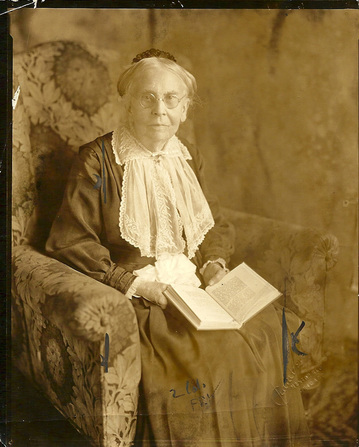
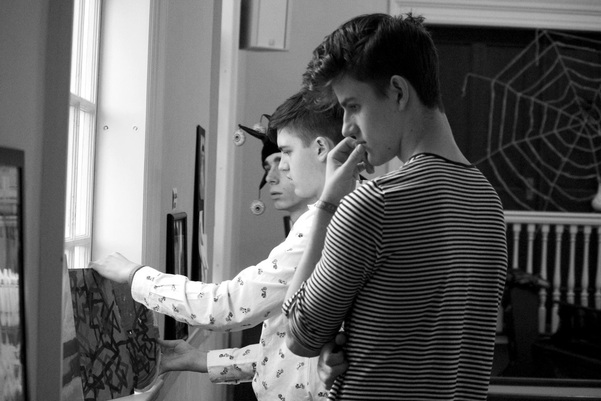
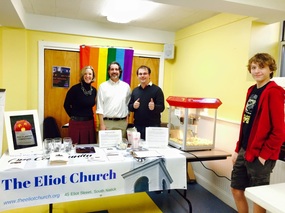
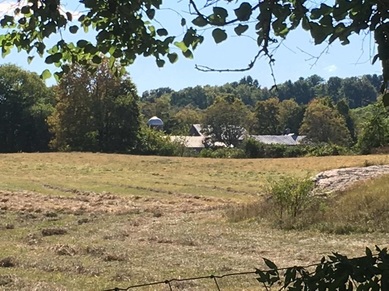

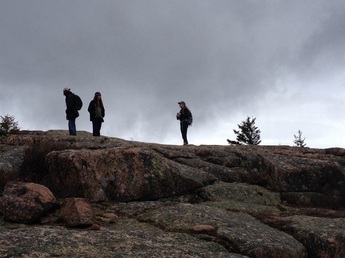
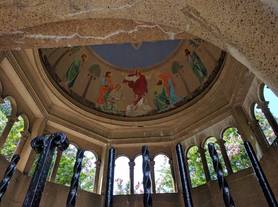

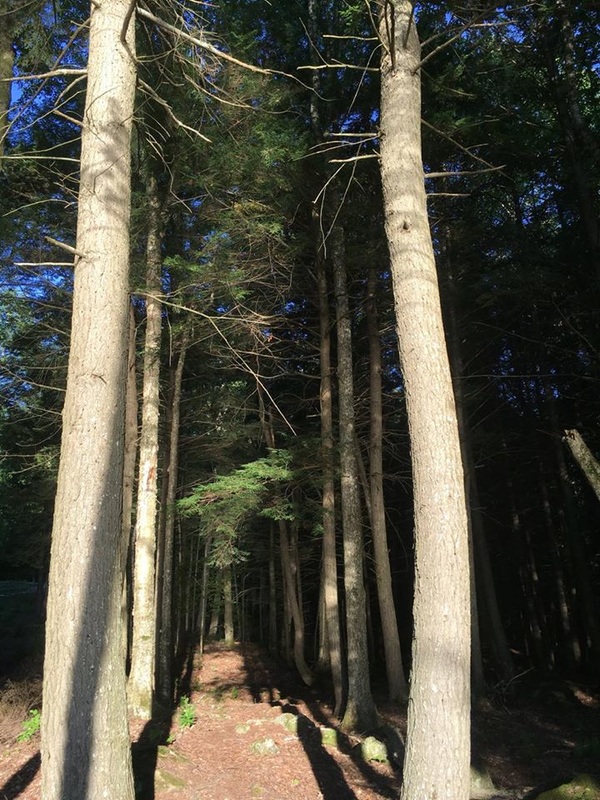
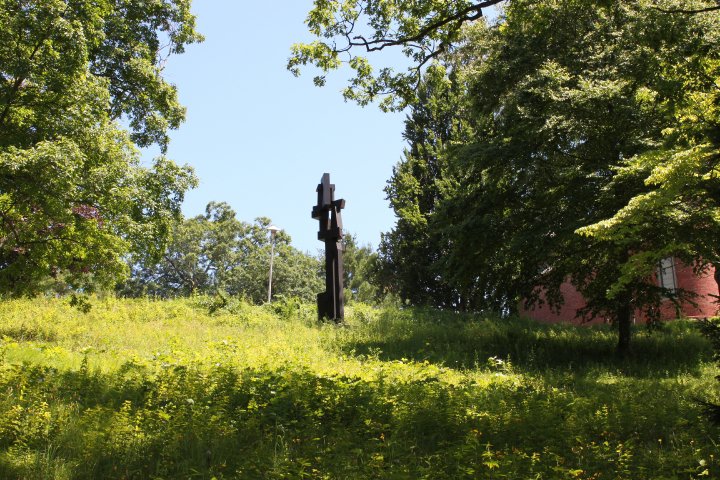
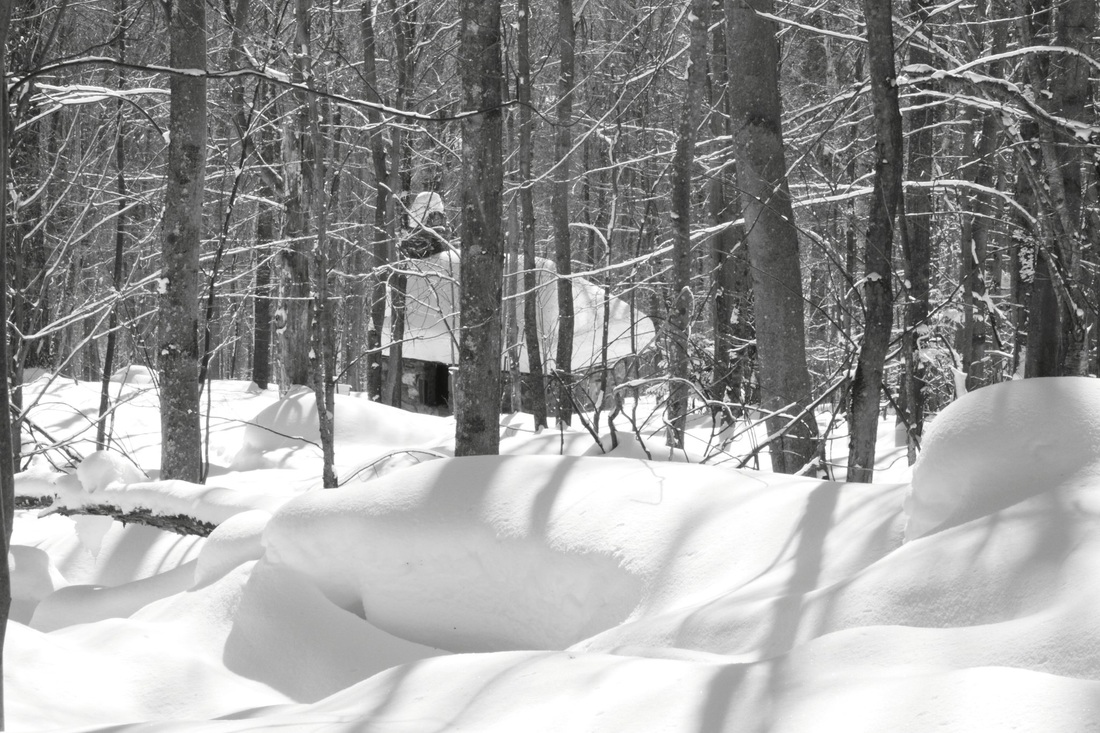
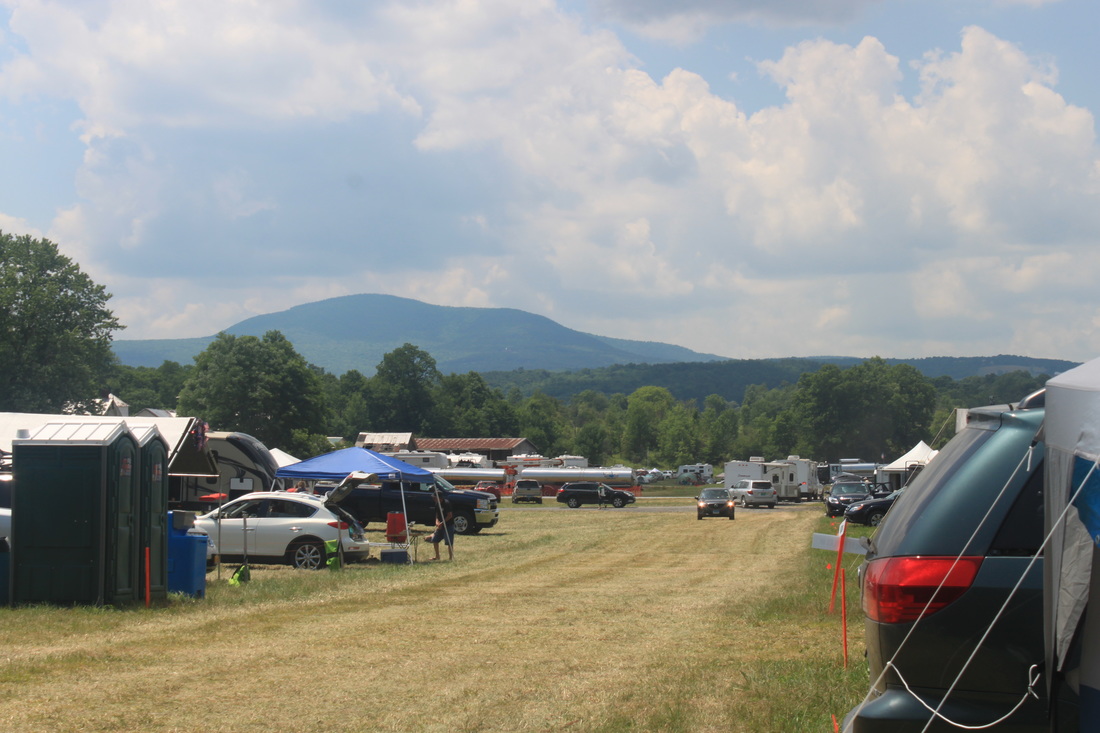
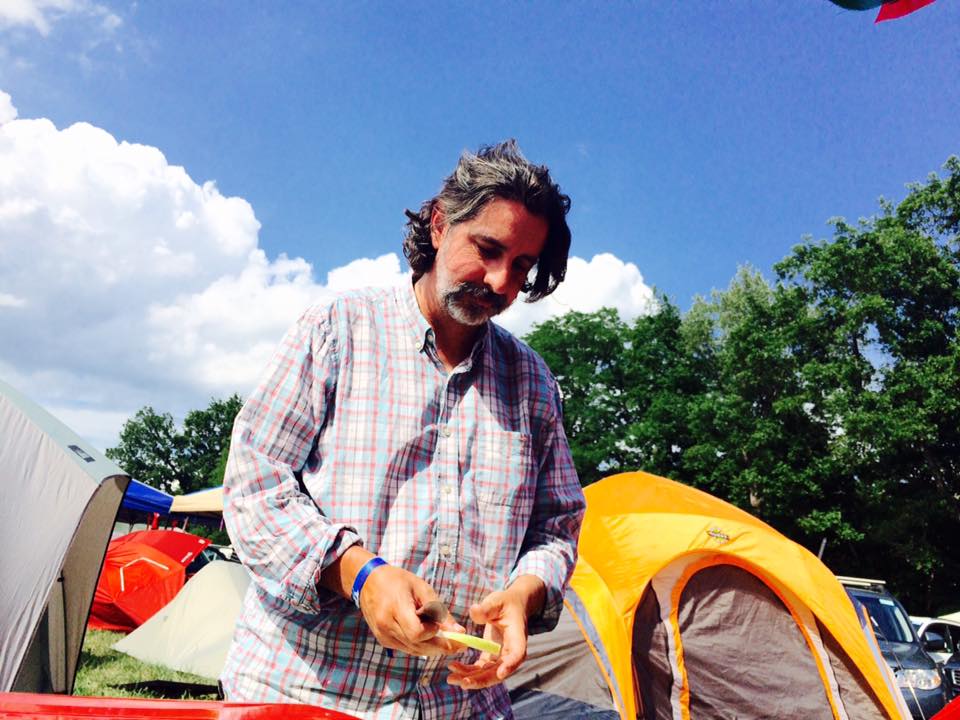
 RSS Feed
RSS Feed